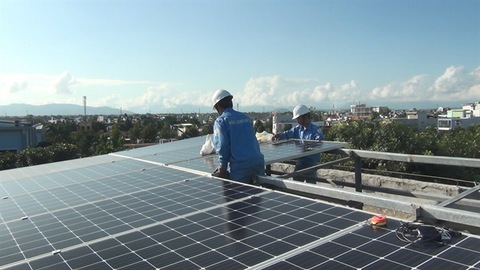
Workers install solar panels in the central province of Quang Ngai. Korean investors are keen to invest in renewable energy in Viet Nam due to its potential and government incentives. — VNA/VNS Photo Sy Thang
Korean investors are keen to invest in renewable energy due to its potential and the incentives that Viet Nam has offered to foreign investors, an HSBC official has said.
Speaking recently with Viet Nam News, Pham Hong Hai, CEO of HSBC Viet Nam, said that electricity was one of the most important investments of Korean businesses into Viet Nam. “Korean firms are now looking to invest in the renewable energy sector.”
The investment trend from South Korea was highlighted at the Viet Nam–Korea Electricity and Renewable Energy Forum held earlier this year.
Viet Nam plans to cooperate with South Korea in reducing greenhouse gas emissions, adaptation to climate change and environmental protection. It will also assist Viet Nam in personnel training and technological transfer in the field, he said.
As the country is growing, Viet Nam needs more power sources. Coal and nuclear power could be short-term solutions, but air quality might be affected.
If Viet Nam pursues sustainable growth, renewable energy is an area that will attract foreign investment.
The Government has issued regulations on tax relief for renewable projects, as well as a strategic plan for renewable energy development and a national power development plan.
Power demand is forecast to grow by more than 10 per cent each year from now to the end of 2020 and by 8 per cent annually during 2021-30.
According to the Viet Nam Energy Association, Viet Nam aims to increase renewable power to 32 per cent of the total energy mix by 2030 and to 43 per cent by 2050.
The potential for developing renewable energy is huge, especially for solar power production as the country is located in the equatorial area with a hot climate all year long in the south and central regions.
Abundant energy sources such as wind, solar power and biomass remain largely untapped, according to Hai.
To realise the great potential of solar power, the Government has developed policies to speed up investment in the sector.
Advantages for foreign investors include the favourable geographic location of the country and the Government's incentive policies.
South Korea’s investment in ASEAN-member countries last year rose by 16.7 per cent over 2017.
Viet Nam accounted for 51.5 per cent of South Korea’s total investment in ASEAN, followed by Singapore with 25.6 per cent.
Last year, South Korea’s investment in Viet Nam recorded significant growth of 60.3 per cent over 2017, with the total amount reaching US$3.16 billion. — VNS